A Look Back on Ten Years of Making Mountain Bikes in the USA
The Prelude
It all started when three passionate mountain bikers bonded over a love for goin’ fast.
The trio’s backgrounds meshed perfectly. All three were lifelong mountain bikers and amateur racers: Will, a born entrepreneur, Matt, a race car and aerospace engineer, and Kristy, a community builder.
Over long road trips down to Angel Fire, NM, they discovered their individual dreams of racing and engineering better mountain bikes, backed by a company with a focus on the community. About 297 miles later, the idea for Guerrilla Gravity was born.

Then: Kristy, Matt, and Will in 2013 (L -> R)

Now: Kristy, Matt, and Will in 2021 with their future riders (L -> R)
2011: The Inception
Sitting around a dining room table, with white knuckles and a beer in hand, the paperwork for Guerrilla Gravity was signed. From that moment onward, GG officially went from a passion-fueled idea to a full-fledged LLC.
From the start, the fundamentals of the company were outlined:
- Made in the USA
- Rider Direct
- Community Driven
All of these were designed to contribute to GG’s mission to “make mountain biking more awesome.”
2012: Humble Beginnings
Like so many great companies, GG started in a garage. Specifically, Chief Engineer, Matt’s garage, the birthplace of the first-ever Guerrilla Gravity bike.
With limited resources but a lot of ambition, they took the chop saws and hand tools to begin working on the very first GG bike. After multiple design iterations, lots of manufacturing prep (which included hand-filing seat tubes, as pictured below), and many long nights, they created their first raw aluminum downhill mountain bike: The GG/DH Alpha prototype.


Chief Engineer, Matt, standing in front of the first fully built Guerrilla Gravity bike
With 200mm of travel and a new high performance/low complexity combination, the GG/DH set the precedent for the company’s forthright motto: “I like Goin’ Fast.” Shortly after, the first frame received its powdercoat. Initially, the decals were spray painted onto the frame using stencils. As you can see below, it didn’t work out great.


They decided vinyl decals were a better starting point.


The original packaging for the GG/DH, putting the leftover spray paint to good use.
The GG/DH traveled far and wide, racing the desert-painted rocks of the Southwest to the moss-lined forests of British Columbia.

The first-ever GG/DH prototype being put to the test on the trails of Whistler.

Matt, racing the GG/DH at Bootleg Canyon with the original logo superimposed.

2013: New Lease on Bikes
As the GG/DH gained traction, they quickly outgrew Matt’s garage. The following 20 bikes were created in a makeshift manufacturing area in a buddy’s workshop, but it was obvious that GG needed a more permanent solution. A few months later, the lease on the first Shredquarters was signed.

Handmade frames and hand-painted signs. The grassroots team worked day and night to get the showroom ready to open.
Situated in the shadow of Mile High Stadium in Denver, the new Shredquarters allowed GG to combine a showroom with bike assembly and provided a larger capacity for its first true in-house manufacturing setup. It was a one-stop shop for all things mountain bikes, and it allowed GG to expand both the team and vision.

The original builder wall showcased the customization options on GG bikes.

It was all hands on deck (and paws too).

The beginnings of the manufacturing space.
2014/2015: The Formative Years
Move over GG/DH, there’s a new bike in the family. In 2014 GG took a big step forward when its second bike was created: the Megatrail. Dubbed “The Big Mountain Liberator,” the 150/160mm travel bike certainly lived up to its name. The Megatrail was one of the first bikes on the market with modern length, and was the catalyst to GG’s diverse and complete bike lineup that would come out only a few short years later.

Pictured above is the first ever sketch of the Megatrail, which soon became the tangible frame you see below.


This time was a turning point for GG, when they received both the Chase for Business Grant and the City of Denver’s Jumpstart Biz Competition. These awards helped to fund the company's next phase of growth. With this, they expanded into the neighboring space, increasing production capacity.


The original "Crush Bus" that toured the U.S. Will was onboard the bus in Oregon when he got the call about receiving the Chase grant.
With these new found resources, they took to the drafting board to continue to build out the GG lineup that we know today.
2016: Short On Travel, Long on Fun
The GG lineup doubled in size in 2016 with the debut of two new bikes, the Trail Pistol and the Pedalhead. The Trail Pistol was the shortest bike in the full suspension lineup, with geometry from 5 years in the future that blew up the norm (77º STA and 1200+mm wheelbase). This bike had everybody asking how to ride a bike with such a steep seat tube angle and long wheelbase…until they rode one. In the present day, this is referred to as modern geometry.

A wild Trail Pistol in the high Alpine with integrated frame storage. A signature GG feature.
The Pedalhead was built as an adventure hardtail on a unique platform that featured a squared custom steel tubeset. The poppy, fun, and dynamic ride quality earned it the nickname of the “adventure hardtail.”

Colorful Pedalheads hanging out in manufacturing.

2017: The Beginning of the Modular Frame Platform
Matt’s early days engineering race cars inspired a new idea for the company. Race cars were built with a modular approach, where the vehicle features interchangeable components to be optimized for each track. He thought to himself, “wait a minute, can’t we apply that to mountain bikes?” And they could. With this, the current full suspension lineup (Megatrail, Trail Pistol, The Smash, and Shred Dogg) was built out with long and short travel modes on both 27.5” and 29” wheels, revolutionizing the industry standard of a “one-bike-quiver.”
This was also the year that The Smash was launched. As a 29er with 140mm of travel, The Smash was the middle child of the lineup. One that ensures you won’t forget about it. Over the next year, The Smash became GG’s best-selling bike.

The Smash frame being welded in house.
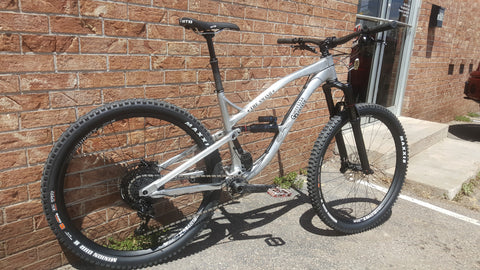
2018: Revving Up...
In the preceding years, carbon fiber was quickly becoming riders’ preference in the mountain bike industry. While industry trends hold influence, GG is known for doing things differently. The 11 person company went back to their original mission of making mountain biking more awesome and figured out a way to apply it to manufacturing carbon bikes.
To start, Chief Engineer, Matt, and the newly-hired Director of Composites, Ben, built up the first R&D area and began testing proprietary manufacturing methods for a new type of impact resistant carbon fiber material just recently commercialized in the aerospace industry. After a few years of research, testing, and iterations, the new type of carbon was ready to be implemented in the manufacturing of GG bikes in 2018.


An Alloy frame (front) being compared to a Revved Carbon frame.
2019: One Small Step for GG, One Big Lead for Bicycle-Kind
2019 was a revolutionary year. Scientists released the first ever image of a black hole and GG launched Revved Carbon.
The Revved Carbon manufacturing was a patented technological breakthrough. This material allowed GG to begin manufacturing carbon frames without sacrificing durability, cost, and domestic manufacturing. After extensive testing, Revved proved to be 300% more impact resistant than traditional carbon for mountain bike frames. The measured durability had a lot of positive implications for GG’s transition to carbon. With this, the lifespan of the bike outpaced your average carbon ride. It also rendered new levels of efficiency, reducing labor time sufficiently to continue building its domestic manufacturing operations.
Boiled down, all this engineering jargon means you get on the trail faster, your bike lasts longer, and the trails you love are less impacted.

Director of Composites, Ben, working on building the Frame Maker 3000, the original Fusing Machine of Revved frames.
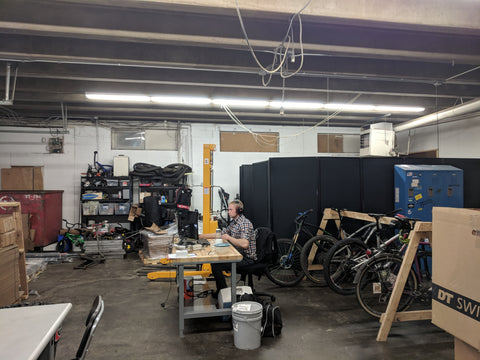
Ben's first "office." Ear protection required as the CNC machines are just out of frame.

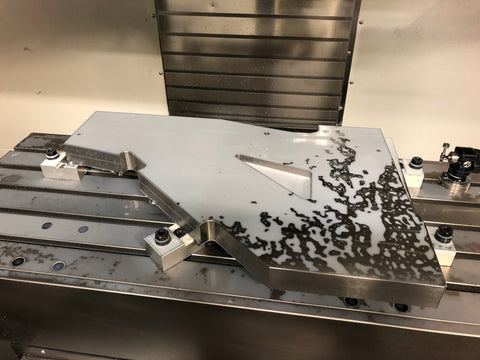
Some of the first Revved Carbon Frames in their molds
Don’t be fooled by these black frames, in reality, they are much “greener.” Revved Frames can be fused in approximately 30 minutes right here in the US, which means less energy wasted and more bikes built. The material is US-sourced and easily powder coated, which eliminates Volatile Compounds (VOC’s) being put into the air from the standard use of wet paint.
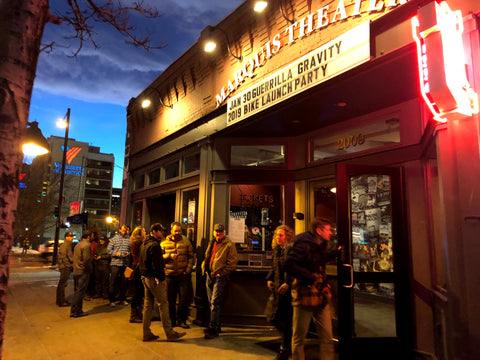
Punk rock roots met high tech design during the Revved Launch Party at the Marquis Theater in Denver.
2020: Pandemic Pandemonium
In 2020, things slowed down for a lot of the world, but in the mountain bike industry they sped up. GG was growing rapidly, so they bid adieu to their beloved Mile High location. Looking to not only increase output but also their team, the search for a new Shredquarters began. A new spot, just south of downtown, was identified, securing a 5x larger space to keep the momentum growing.

Farewell Bryant Street, one of the CNC machines starts it's journey down I-25.


Several of the CNC machines moving into the new Shredquarters.
2021: A Look Towards the Future
2021 kicked off with a bang, signing Yoann Barelli to join the team. A passionate rider with mutual values and a constant mission to push the limits of possibility.
Meanwhile, the build out of the new facility continued, increasing capacity and efficiencies with a vision to become a beacon for the reshoring movement in the cycling industry.

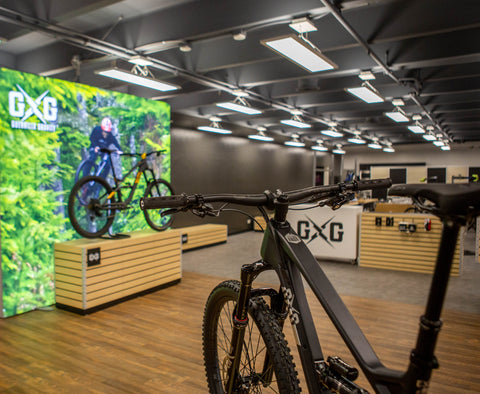

It was all hands on deck to bring the showroom to what you see today.

A frame going into the new Fusing Machine (a.k.a The Frame Maker 10K).

Powder coating was brought in-house at the new facility.

Current water slide decals are a significant improvement from the days of spray painted and vinyl cut decals.
It’s hard to pack the last ten years of bikes, sweat, and beers into a few pages. At the end of the day, however, it all comes down to this:
-
Thousands of bikes made in the USA
-
Countless design iterations culminating in the patented Revved carbon line of bikes today
-
65 team members focused on building the next generation of mountain bikes
-
A supportive and diverse community of riders
So, when you pass another GG rider on the trail, throw your horns high, and know that you are a part of “making mountain biking more awesome.”


